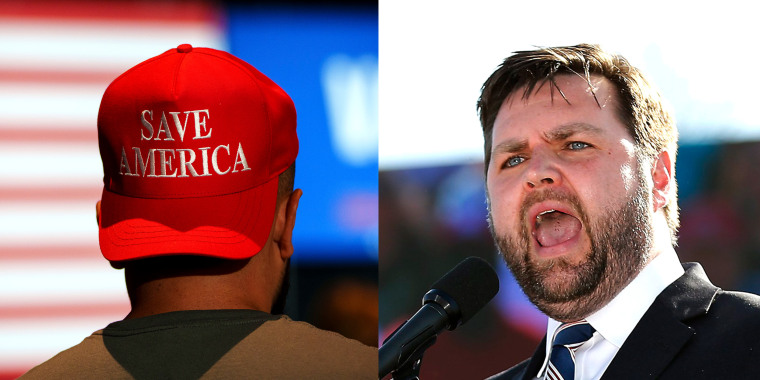It’s an article of faith in the world of American political strategy that a poorly performing economy is the greatest liability for an incumbent party. Given that, one might think Republicans would be laser-focused on hammering President Joe Biden over the fact that inflation is the highest it has been in decades. But if this cycle's GOP primaries contests are any indication, cultural and social fights, not economic ideas, are at the center of the Republicans’ plan as the midterm elections approach.
Much of this phenomenon can be tied to Trump’s influence on the party.
Nebraska gubernatorial candidate Charles Herbster, a front-runner in Tuesday’s Republican primary, has pledged to deal with the economy by changing the state’s tax code, but he’s made more notable splashes by focusing on cultural and social issues. He's calling for sex education to be put “back in the homes where it belongs” and promised to vanquish “critical race theory.” He has also argued for the need to bring prayer into the public schools. His high-profile endorsers have pointed out his commitment to "conservative values." And he has aggressively brandished the endorsement — and hand-gesturing style — of the ultimate right-wing culture warrior: Donald Trump. (Also, like Trump, Herbster has been accused of sexual assault by many women and has denied the accusations.) Proposing how he might combat inflation's effects on Nebraskans, as many governors have, doesn't seem to be the main game plan.
Herbster is part of a broader pattern. As a recent Washington Post analysis put it, “In primary races ahead of November’s midterm elections, Republican candidates are embracing contentious battles over gender, sexual orientation and race rather than sticking to tried-and-true attacks on inflation or Biden’s low approval ratings.”
J.D. Vance, the Ohio Republican nominee for the Senate who won last week’s primary election, has ranted about the scourge of critical race theory and called it a threat to free speech, and said bizarre things about Democrats’ being controlled by childless adults. When Vance has talked about economics, it has often been through a culture war framing; he has warned, for example, that the Democratic Party “bends the knee to major American corporations and their ‘woke’ values,” and that student loan debt forgiveness would be a windfall for “the corrupt university administrators of America.” Mehmet Oz, a Senate candidate running in next week’s Republican primary in Pennsylvania, riles up crowds by vowing to fire Biden’s chief medical adviser, Dr. Anthony Fauci, and to keep borders “clean.”
At a time when there is extraordinarily widespread discontent with the state of the economy because of surging inflation, it’s fascinating to see so many Republican candidates focus so heavily on culture wars.
To be clear, primaries are different from general elections, and a lot could change before November. And Republicans certainly haven't ignored inflation altogether as an issue. But in our polarized era, primaries can be decent previews of general election contests, since politicians focus increasingly on turning out the base over persuading moderates, and the relative emphasis on cultural issues so far is striking. Last year some Republicans went all in on culture wars in general elections, including Glenn Youngkin, whose successful bid for governor of Virginia focused intensely on critical race theory. (Youngkin’s victory was likely partly fueled by a general backlash against an incumbent party, but, nonetheless, his successful strategy has become a playbook for Republicans.)
Much of this phenomenon can be tied to Trump’s influence on the party. Trump found talking about economic issues boring and preferred to stir up fights over cancel culture and provoke fears about immigration. While he did boast about economic growth during his tenure, his core case to the public involved mobilizing his base through fear. He constantly conjured up the specter of its loss of status in society and the erosion of its conception of American culture. As Republicans’ high-turnout losses in 2018 and 2020 elections showed, that approach doesn’t guarantee victory — but it does mobilize the base.
Before the Trump era, it would have been hard to imagine that surging inflation in an election year wouldn’t have become the central crisis that Republicans would promise to tackle. (Midterm elections wouldn’t allow newly elected politicians to change the direction of the national economy, but one could easily imagine Republicans promising to torpedo any effort at social spending.) Instead, the great crisis Republicans promise to deal with revolves around the idea that Democrats have gone too far in trying to create a more socially inclusive society.

